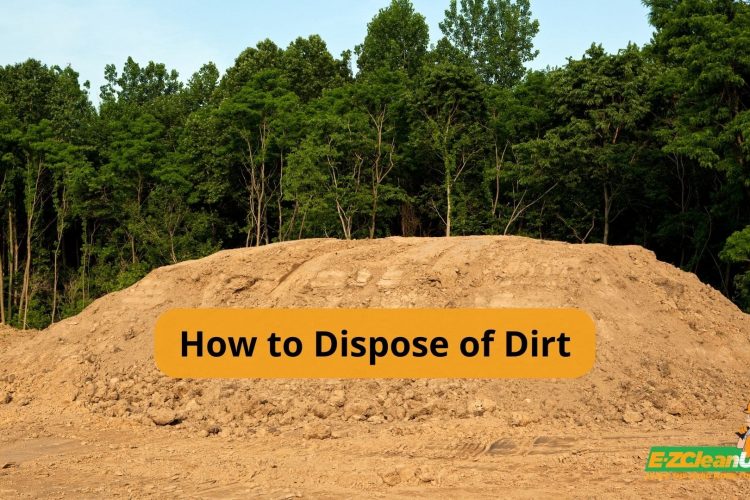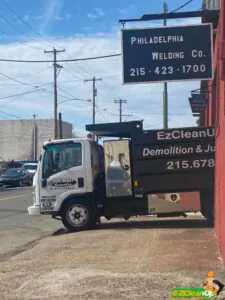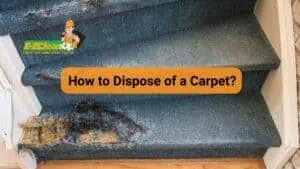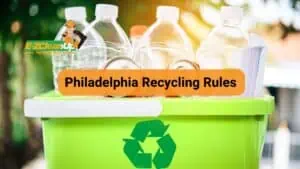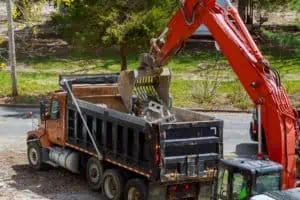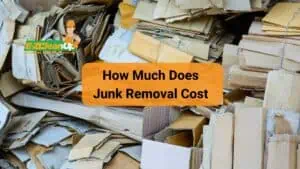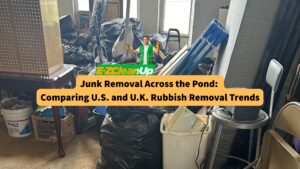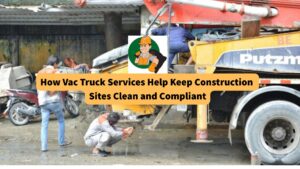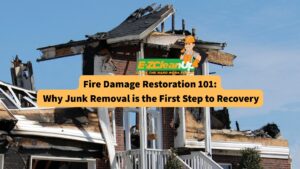If you’re wondering how to dispose of dirt, here are your best options:
- Bring the dirt to a recycling facility.
- Give it away.
- List it online.
- Rent a dumpster.
- Hire a junk removal company.
- Take it to the dump.
I’ll explain each step in detail. So, continue reading to learn more!
How to Dispose of Dirt?
Whether you have leftover soil from a gardening project or have excavated dirt from a construction site, here are some efficient methods to get rid of it.
1. Bring the Dirt to a Recycling Facility
Recycling facilities often accept clean dirt, which they can process and reuse for various purposes. Before heading to a recycling facility, ensure your dirt is free from contaminants such as glass, plastic, or hazardous materials.
Reach out to the nearest recycling facility and confirm if they accept dirt. Some facilities might have specific guidelines or fees associated with dirt disposal. Once confirmed, load the dirt onto a truck or in bags and make sure it’s safe for transport.
2. Give It Away
If your dirt is of good quality, consider giving it away to those who might need it:
- Neighbors and Friends. Someone in your neighborhood might be in need of some extra soil for their gardening projects.
- Community Gardens. Local community gardens often require soil for their patches. Offering them your spare dirt can be a win-win.
- Advertise. Place a sign on your property or post on community bulletin boards to let others know you have dirt available for free.
3. List It Online
In this digital age, everything can be sold or given away online, and dirt is no exception. Here’s how you can utilize the power of the internet:
Check out websites that connect those who have dirt to dispose of with those who need it (or just use social media). You can also list the dirt as an item for sale or giveaway on some platforms. Simply take a picture of your dirt, provide a brief description, and specify whether you’re giving it away or selling it.
If you’re aware of the quality or composition of your dirt (like if it’s topsoil, clay, or contains rocks), mention it. It helps potential takers to know if it fits their requirements. When arranging pickups, always ensure safety. Choose a public place for exchange if possible, or ensure you’re not alone during the pickup if it’s at your property. Always inform someone close to you about the exchange details.
4. Rent a Dumpster
Renting a dumpster can be an ideal solution for those with a considerable amount of dirt to get rid of, especially from large landscaping or construction projects. Here’s what you should know about this method:
- Size Matters. Dumpsters come in various sizes, typically measured in cubic yards. Depending on the amount of dirt you have, you can choose from a 10-yard, 20-yard, or even a 40-yard container. To avoid overpaying or running out of space, estimate the amount of dirt you have before renting.
- Drop-off and Pickup. When renting a dumpster, the company typically drops it off at your location, where you can fill it up at your own pace. Once filled, the company picks it up and properly disposes of the dirt. Ensure there’s adequate space for the dumpster’s placement and pickup.
- Fees and Restrictions. It’s important to be aware of the costs associated with renting a dumpster. While some companies offer a flat fee, others may charge by weight. Also, check if there are any restrictions on what can be placed in the dumpster, as mixing dirt with other waste might result in additional fees.
- Permits. If the dumpster needs to be placed in a public area, such as a street, you might need a permit. Check local regulations and work with the rental company to secure any necessary permissions.
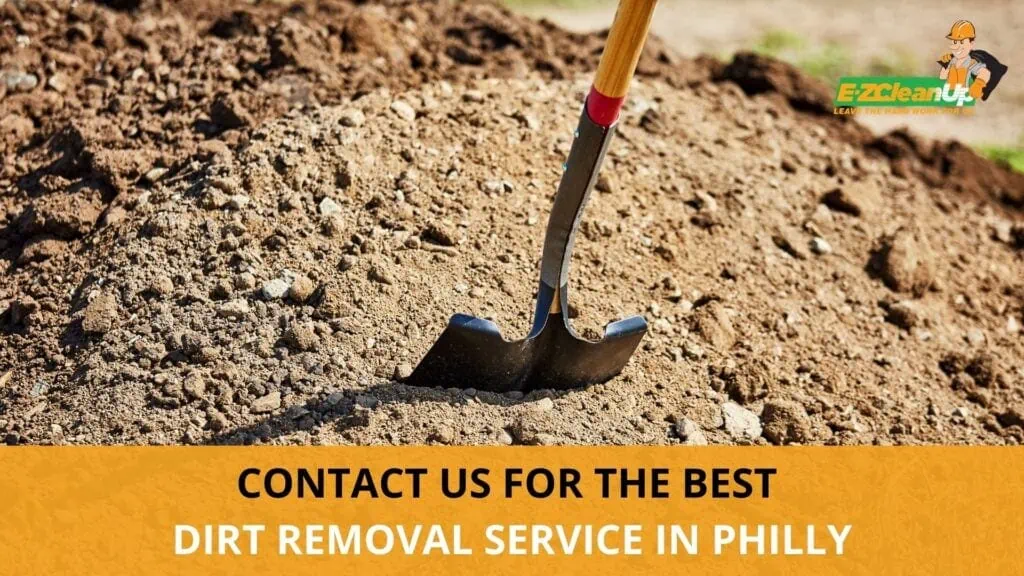
5. Use a Junk Removal Service
If you prefer a more hands-off approach or don’t have the means to transport dirt yourself, junk removal companies can be a lifesaver. The primary benefit of using a junk removal company is convenience. They handle everything from collecting the dirt to its proper disposal, which saves you time and effort. These companies are professionals with the necessary equipment and knowledge to handle large volumes of dirt or soil. They ensure proper dirt removal without harming the environment.
[brb_collection id=”12701″]
While there’s a fee involved, considering the time, energy, and potential vehicle rental savings, using a junk removal service can often be cost-effective, especially for large projects. Handling large amounts of dirt can be messy and potentially hazardous. Professionals ensure the dirt is removed safely, minimizing risks and leaving your space clean. Most junk removal companies offer flexible scheduling, which allows you to choose a pickup time that’s convenient for you.
If you want to experience these benefits from a reliable junk removal company in Philadelphia, look no further than EZ CleanUp. We handle all kinds of junk, including dirt, at rates you can afford. Call us to know more.
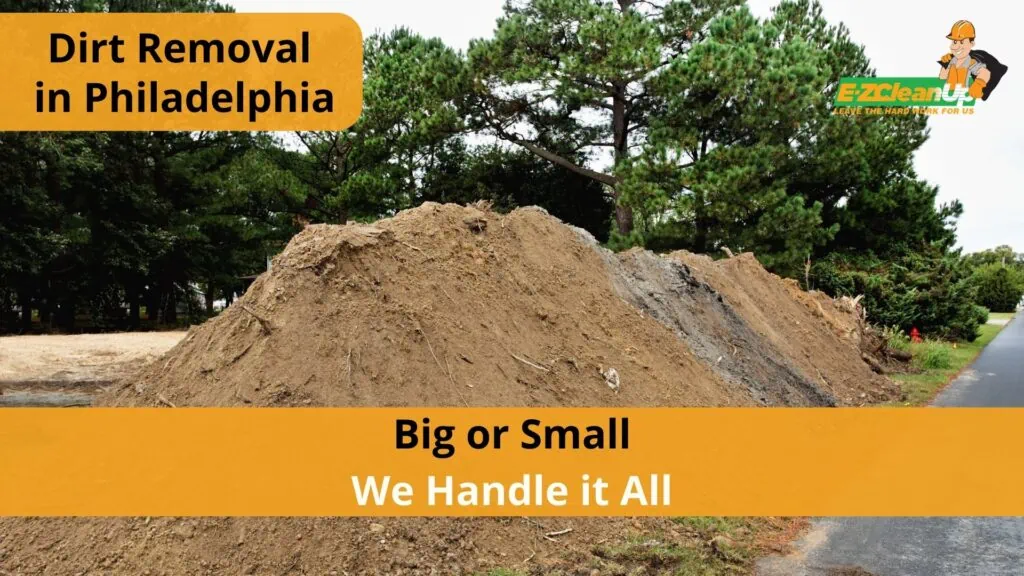
6. Take It to the Dump
If recycling isn’t an option or you simply want a straightforward method to dispose of a large amount of dirt, the local dump or landfill might be your solution. Before taking dirt to the dump, check local regulations. Some dumps may have restrictions on the type of dirt they accept, especially if it might be contaminated. Dumps usually charge by the weight or volume of the dirt you’re disposing of. It’s a good idea to call ahead and inquire about fees so you’re not caught off guard.
Also, some landfills offer discounted rates for clean dirt since it can be used for cover. When transporting large amounts of dirt, ensure your vehicle can handle the weight. Secure the load properly to avoid any spillage on the roads. Wear gloves and masks if necessary to prevent inhaling any dust or coming into direct contact with potential contaminants.
Legal and Environmental Considerations
When disposing of dirt, it’s not just about finding a place to dump it or someone to take it. It’s also crucial to be aware of the legal and environmental considerations that might apply.
Local regulations and permits related to dirt disposal are in place to protect the environment, maintain public health, and ensure public spaces and infrastructure aren’t misused or harmed. Improperly disposed of dirt can lead to problems like water pollution, blockage of drainage systems, and disruption of natural habitats.
Different jurisdictions might have varying regulations. Common regulations include:
- Zoning Restrictions. Certain zones might be designated as no-dump areas, especially if they’re environmentally sensitive or close to water bodies.
- Type of Dirt. There might be restrictions depending on the type of soil or its contamination level. For instance, dirt mixed with construction debris or contaminants might require special disposal methods.
- Volume Restrictions. Some areas might have limits on the amount of dirt you can dispose of at once.
- Obtaining Permits. If you plan to dispose of a large amount of dirt or if the dirt’s destination is a public area, you might need a permit.
How Much Does Dirt Removal Cost?
Dirt removal expenses can vary based on several factors, including the volume of dirt, its type, your location, and the disposal method you choose. Let’s go into the specifics of these costs:
Breakdown of Costs with EZ CleanUp
Here’s a general breakdown of the costs, if you want an accurate estimate, contact us!
- Minimum Load. For the smallest loads, which might include minor garden work or small excavation projects, the cost can start from $150.
- 1/4 Truck Load. For slightly larger projects, which comprise about a quarter of a truckload of dirt, you might be looking at approximately $249.
- 1/2 Truck Load. If your dirt fills up half a truck, the cost can rise to around $375.
- 3/4 Truck Load. Three-quarters of a truckload can take the price up to about $475.
- Full Truck Load. For a full truckload of dirt, you might be looking at an estimated cost of $599.
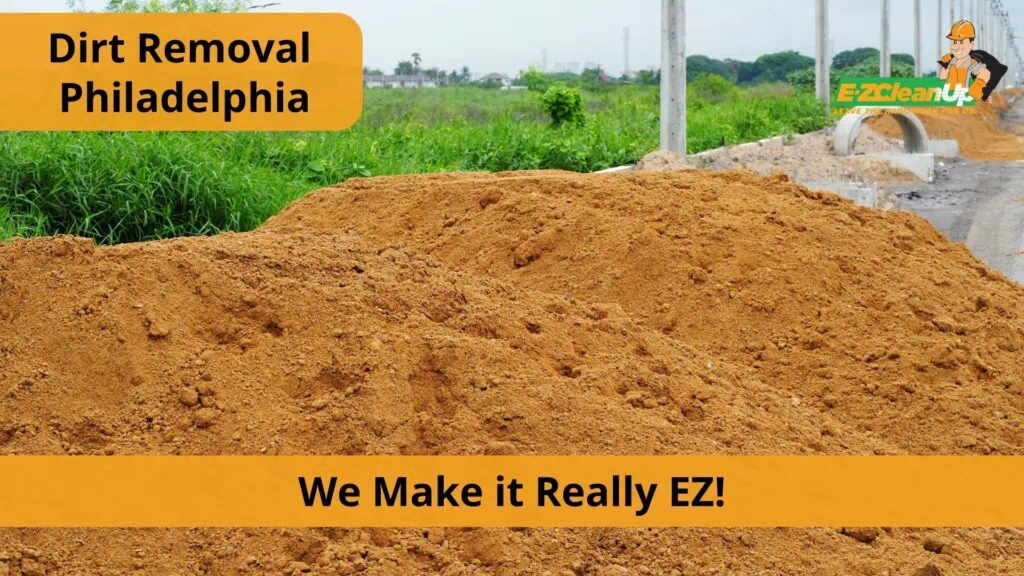
Factors Influencing Dirt Removal Cost
- Volume and Weight. Typically, the more dirt you have, the higher the cost. Most companies charge based on the amount of dirt, either in terms of volume (cubic yards) or weight. At EZ CleanUp, our prices start from as low as $150 for smaller loads (1/8 truckload) and can increase up to $599 for a full truckload.
- Type of Dirt. If the dirt is mixed with debris or contaminants, the removal might be more expensive due to additional processing or specialized disposal requirements.
- Location and Accessibility. The ease with which the dirt can be accessed and the distance it has to be transported can influence costs. For example, it might cost more if the dirt is in a hard-to-reach location, requiring specialized equipment or additional labor.
- Disposal Fees. Some disposal methods, like taking it to a dump, might involve fees. These fees can vary depending on local regulations and the specific dump or landfill in question.
The Different Types of Dirt
Just as there are numerous varieties of wood, water, or even air based on their components and properties, dirt also comes in varieties. Knowing the specific type of dirt you’re dealing with can guide you to the most appropriate and environmentally friendly disposal method.
Different Types of Dirt and Their Disposal Methods
Topsoil
Topsoil is the uppermost layer of the soil, typically the top 2 to 8 inches. It is rich in organic matter and nutrients, which makes it ideal for planting and gardening. Given its fertility, topsoil is in high demand. Rather than disposing of it, consider giving it away to gardeners, landscapers, or community gardens. If you must dispose of it, recycling facilities often accept topsoil for repurposing.
Fill Dirt
Fill dirt is found beneath the topsoil and lacks the organic matter that characterizes the latter. It’s mainly used to fill holes or raise ground levels. Given its nature, fill dirt is best reused in construction or landscaping projects that require leveling or filling. If that’s not an option, it can be brought to construction sites or offered online to those in need. If you have to dispose of it, ensure it’s clean and take it to a recycling facility.
Contaminated Soil
This refers to soil that has been polluted with hazardous substances like chemicals, heavy metals, or petroleum products. Its presence can be harmful to health and the environment. Contaminated soil requires special care. It should not be mixed with other types of soil or used in gardening or construction. Instead, contact environmental agencies or specialized disposal facilities that can handle hazardous waste. They’ll guide you on the safe and legal disposal of such soil.
Clay Soil
Characterized by its sticky texture when wet, clay soil is composed mainly of fine mineral particles and can retain water well. Due to its water retention properties, clay soil can be useful in certain gardening scenarios. Consider offering it to gardeners who might need it to amend their existing soil. Alternatively, it can be mixed with organic matter to improve its texture and reused.
Sandy Soil
With larger, coarser particles, sandy soil drains quickly and doesn’t hold onto moisture well. It feels gritty to touch. Sandy soil is ideal for plants that prefer well-drained conditions. You can offer it to cactus or succulent enthusiasts or use it to improve soils that retain too much moisture. If you need to dispose of it, consider listing it online for those who might need it for specific planting needs.
Potential Contaminants and Hazardous Materials in Dirt
Soil is a dynamic system that constantly interacts with its environment. Over time, human activities and natural processes can introduce contaminants to it, turning benign dirt into potentially hazardous material. Let’s explore some common contaminants and why they’re concerning.
Heavy Metals
Industrial processes, vehicle emissions, sewage sludge, and even some agricultural practices can introduce heavy metals like lead, arsenic, cadmium, and mercury into the soil. These metals can be toxic to plants, animals, and humans. When ingested or inhaled, they can lead to different health issues, from neurological disorders to cancers.
Pesticides and Herbicides
These chemicals, widely used in agriculture to protect crops from pests and weeds, can persist in the soil. Over time, they can accumulate in the food chain, which can lead to potential health risks when consumed. They can also harm beneficial soil organisms and disrupt natural processes.
Petroleum Products
Leaks from underground storage tanks, oil spills, or runoff from roads can introduce petroleum products like oil and gasoline into the soil. These contaminants can harm soil structure and kill beneficial microorganisms. If they reach water sources, they can lead to further environmental damage and health concerns.
Solvents
Industrial processes, improper disposal of household chemicals, and some agricultural practices can introduce solvents to the soil. Many solvents are toxic and can harm both the environment and human health. They can contaminate groundwater, posing long-term risks.
Asbestos
Older construction materials, broken asbestos-containing products, or natural asbestos deposits can release this mineral fiber into the surrounding dirt. Inhalation of asbestos fibers can lead to severe respiratory diseases, including a type of cancer known as mesothelioma.
Radioactive Materials
Accidents at nuclear facilities, certain mining practices, or natural deposits can introduce radioactive elements like radon, uranium, or cesium to the soil. Exposure to high levels of radiation can lead to various health issues, including cancer.
Bacteria and Pathogens
Sewage leaks, improperly composted organic materials, or runoff from livestock operations can introduce harmful bacteria or pathogens to the soil. These microorganisms can cause diseases in humans and animals if they contaminate food or water sources.
Dirt Recycling Options
When we think of recycling, items like paper, glass, or plastics often come to mind. However, dirt, too, as surprising as it may sound, can be effectively recycled. Recycling not only reduces the strain on landfills but also conserves natural resources. Exploring these options can lead to environmentally friendly and cost-effective solutions to the age-old question of what to do with surplus dirt.
Here’s how the process looks like:
Saving for Future Use
Instead of hastily getting rid of excess dirt, consider storing it for future needs. This approach is practical for:
- Gardening Projects. Whether it’s creating raised beds, leveling the garden, or starting new patches, having stored dirt can be handy.
- Repair Work. Stored dirt can be useful for filling holes, addressing erosion issues, or leveling out depressions in a yard.
- Composting. Mixed with organic matter, this dirt can become a vital component of a composting process.
Approach a Gardening Supplier
Local gardening or landscaping suppliers often accept clean dirt, either for free or for a nominal fee. They typically:
- Repurpose the Soil. The dirt is often mixed with other materials to create garden mixes or potting soils.
- Sell to Landscapers. These suppliers often serve as a middleman, supplying landscapers and gardeners with the soil they need for various projects.
Connect with a Building and Demolition Recycler
Many Construction and Demolition (C&D) recyclers also deal with dirt, especially from construction sites:
- Repurposing for Construction. The clean dirt is used as a base for roads, as backfill material, or in other construction-related capacities.
- Treatment and Resale. Some C&D recyclers treat the soil, if necessary, and resell it for various applications.
- Eco-friendly Disposal. If the dirt isn’t suitable for immediate use, these recyclers ensure it’s disposed of in an environmentally responsible manner.
Frequently Asked Questions About Dirt Disposal
Let’s look into some frequently asked questions about dirt disposal and provide clear, helpful answers.
Is It Possible to Get Rid of Soil Mixed with Debris or Other Substances?
Yes, but the method may vary depending on the mixed materials:
- Organic Materials. If the dirt is mixed with organic matter like leaves or grass clippings, composting might be an option.
- Construction Debris. Some Construction and Demolition (C&D) recyclers can take dirt mixed with rubble, but there might be specific requirements or fees.
- Hazardous Materials. If the dirt is mixed with potentially harmful substances, specialized disposal methods will be needed, and it’s best to consult with local environmental agencies.
What Steps Should I Take for Contaminated Soil Disposal?
Contaminated soil requires careful handling due to its potential hazards. First, identify the nature of the contamination, which might require professional soil testing. Reach out to local environmental or public health departments for guidance on handling and disposal.
Lastly, seek facilities equipped to handle and treat hazardous waste. They can guide the disposal process and ensure the dirt is managed in an environmentally responsible manner.
A Clear Path to Responsible Dirt Disposal
Disposing of dirt may seem like a straightforward task, but as we’ve discussed, there are many considerations to keep in mind.
Whether dealing with excess soil from a landscaping project, gardening, or construction work, taking the right steps ensures you not only free up valuable space but also contribute to a cleaner, safer environment.
It’s not just about freeing up space – It’s about making choices that benefit both you and the world around you.
If you’re looking for professional assistance in dirt or junk removal, consider EZ CleanUp. We’re a licensed and insured junk removal company in Philadelphia that specializes in a wide range of services, from cleaning out garages, yards, and basements to managing construction site debris.
Whether you need to rent a dumpster, require demolition services, or are seeking comprehensive junk removal solutions, we’ve got you covered. Call us now for a free quote for your dirt disposal project. ☎️

